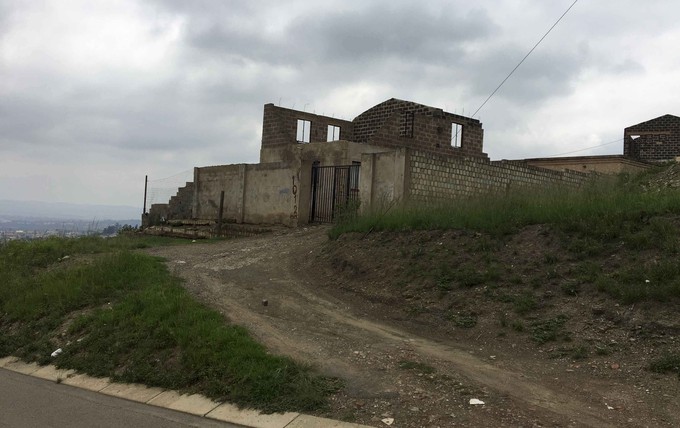Imbali residents tired of politicians’ empty promises
“Come election time they’ll come with food parcels”
Residents of Imbali in Pietermaritzburg have been waiting for four years, renting from neighbours, for their new houses to be finished. Some have lost faith in the authorities.
More than 100 double storey houses, designed to house residents whose faulty houses were demolished or who were made homeless by a storm in 2012, are still unfinished. Residents say have to rent from their neighbours, while their questions to ward councillor Philisiwe Sithole and to the Department of Human Settlements go unanswered.
Thobeka Ntombela says she pays R700 a month for space in a house near the double storey house she was supposed to own with her family of six. She works as a cleaner at a nearby clinic. She has lost patience with the authorities.
“It’s time they gave us answers. Our houses were demolished in 2012. Other houses were very old and others like mine were damaged by the storm. According to what the ward councillor told us at a community meeting ages ago, those who were affected by the storm were to be prioritised. That didn’t happen. It was the other way around. For the past four years the ward councillor and the Department of Human Settlements has never provided us with positive feedback or a way forward,” says Ntombela.
When GroundUp visited the area, only a few residents were living in the double storey houses. Some of the new houses have no roofs; others are without doors and windows. Some have been taken over by whoonga and dagga users.
Ntokozo Dladla rents a house with her husband and their four-year-old daughter.
“Our house was demolished and we were not given a place to stay”, says Dladla.
“We have been renting for all these years. I’m the only one who works. I sell fruit, vegetables and chips in town. We are living a hard life and no one is courageous enough to tell us what is going on. These so-called politicians are nowhere to be seen. The only time we will see them is when they will be campaigning for votes. They haven’t shown their faces to see the kind of life we are living.
“I promise you, come election time they will have guts to come with food parcels making empty promises as usual. If I see them near this house I will set dogs on them. They are insensitive,” she says.
“The worst part is that the ward councillor is clueless about the whole thing. You ask her what is going on and she mumbles without any answers.”
Contacted by GroundUp, ward councillor Sithole said the housing project would continue in a few months. “We have asked families to come to us with their documents stating that they are the owners of houses so that we continue with the project. Some of the people have come with their documents. Once that is finished, we will then continue, “ she said.
But provincial Department of Human Settlements spokesperson Mbulelo Baloyi said the problem was a “misunderstanding” with the developers.
He told GroundUp the MEC for Human Settlements and Public Works Ravigasen Pillay had met Fairfield, the developers, “with an intention to find out what could have been the bottlenecks that have delayed the continual of the project”. Pillay had also met senior department officials in order to sensitise them to the urgency of the project, said Baloyi, and it had become apparent that there had been “a minor misunderstanding with regard to the construction alignment and variation costs”.
“Preliminary paperwork” had now been signed and the department would be in touch with the municipality to “finalise the outstanding paperwork”, Baloyi said, so that the project could get going again within three months.
Support independent journalism
Donate using Payfast

Don't miss out on the latest news
We respect your privacy, and promise we won't spam you.
Next: Students at nursing college protest exclusions
Previous: Poor, black people are still denied access to public space
© 2016 GroundUp. 
This article is licensed under a Creative Commons Attribution-NoDerivatives 4.0 International License.
You may republish this article, so long as you credit the authors and GroundUp, and do not change the text. Please include a link back to the original article.

